There are several categories of coir fibre depending on the extraction process, namely 1-tie, Oamtt and mattress fibre. The fibre strands have a very high lignin content surrounding the cell walls. it gives high resistance in withstanding tension to fibre. Coir fibre is 100% natural and eco friendly and used in many industries such as Agriculture, Horticulture, Packaging, Bedding, Flooring and Insulation.
Properties of coir fibre as an average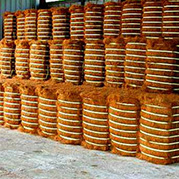
Coir fibre extracted from the coconut husk is cleaned and compressed in to a bale of 150 kgs. The weight is varied from 100 kg to 160 kgs. Coir fibre could be treated with chemicals to add flame retardant properties.
Coir fibre bales are used in making bedding (solid mattress, spring cover sheets), cushioning in making sofa, filtering, making erosion control applications, acoustic and thermal isolation.
Bedding products from coir fibre is cool, clean and comfortable, healthier than synthetic products, recommended for better spinal movement in sleep.
About 160 bales of 150kg bales are loaded into a 40HC container to make 24MT, in general
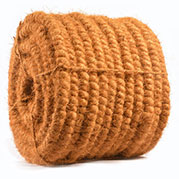
Coir fibre is mechanically twisted into a rope and supply in coils (rolls) of about 22 kgs. When the rope is untwisted the fibre is in curled (twisted) form and it will give a better spring effect to the fibre. Also provides better penetration of latex to add more value. According to the customer requirement, the twisted roll could be made with even 125kg.
Twisted coir fibre is used in high end products of bedding and upholstery. IE in using spring cover sheets to be used in spring mattress, in using making upholstery is automobiles with latex.
Depending on the category of fibre loading vary from 21MT to 24MT in 40HC container.
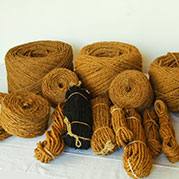
Coir bristle fibre is mechanically spun and produced coir twine with a flexible manner yet with a sufficient breaking strength to be used in garden applications, such as fencing, tying etc, Twine is available in various colors, mainly natural, black and brown
The garden twine is produced with linear densities of 180m/kg, 200m/kg and 220m/kg. The thickness varies from 4mm to 6mm. The twine is presented in different packages such as hanks with 20m, balls with 100m, 500m etc. On average the loading quantity for a 20FT container is about 5MT.
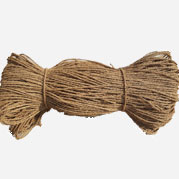
Coir Bristle fibre extracted from the coconut husk is mechanically spun into a 2-ply coir twine with a help of a cotton thread which runs inside of each ply. We supply hop twine into three major hop fields Ie, in USA, UK and in Australia.
For USA and Australia: 2,400 strings of 100lb twine of 21’ cut length can be compressed into one bale. 150 such bales can be loaded into one 40HC container
For UK: In balls, 16MT in a 40HC container
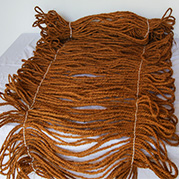
Coir Bristle fibre extracted from the coconut husk is mechanically spun into a 2-ply coir twine with a help of a PP thread rans inside of each ply. Used as a growing media for Oyster / Mongi. Aqua twine is supplied in rolls and in netting
We load 960 rolls into a 40HC container, ensuring mini weight 18MT. About 6000 standard nets could be loaded into a container.
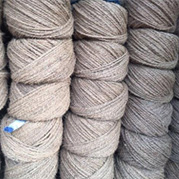
Coir bristle fibre is mechanically spun and produced coir twine with 6mm thickness. Coir twine with its strength, flexibility and most importantly the grip provide an excellent support in construction field. The twine is with 2ply and the cotton thread inside of each ply.
The twine is 5mm thick and pack in balls of 3 kgs. A bundle of 4 such balls is made for easy handling. Can load about 15MT in a 40HC container and about 6MT can be loaded into a 20FT container
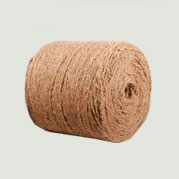
Coir bristle fibre is mechanically spun and produced coir twine with an even thickness though out the twine to be used in making wall to wall carpets. The common linear densities of the twine is 180m/kg, 220m/kg.
The common packing is in twine hanks of 2.5kg. About 12MT can be loaded into a 20FT container
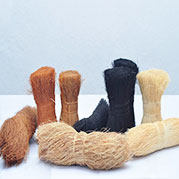
Coir bristle fibre is hackled and make hanks of “bristle fibre 1-tie” and “bristle fibre 2-tie”. Bristle fibre cut into a specific length is also supplied. The common cut length is 18cm though it is customized. Bleached bristle fibre with H2O2 (hydrogen peroxide) and dyed bristle (mostly in black) are available.
We supply coir bristle fibre in forms of 1-tie or 2-tie mainly into brush and broom industry,
Bristle fibre is packed in bales of 25kg, 50kg, 100kg and bags of 12.5kg or 25 kgs. About 7,5MT can be loaded into a 20FT container about 15MT into a 40FT
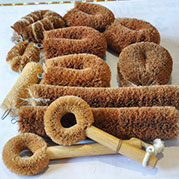
Bristle fibre which is strong category of coir fibre family is used to produce Tawash brushes. Bleached, dyed, hackled fibre are used to make tawasi brushes and brooms. There is a large number varieties and model of tawashi brushes and brooms.
This is an excellent product for cleaning, from cleaning wooden chopping boards, pots and pans wiping down the kitchen bench and also cleaning cast iron this scrubber can do it all.
The flexibility of the fibre, capillary properties of the fibre, strong flexible structure give the competitive advantage to the tawashi brushes and brooms.
Commonly the product is packed on cartons to export, with or without pallets.
| Water soluble | 5.25% |
| Pectin & related compounds | 3.30% |
| Hemi-Cellulose | 0.25% |
| Cellulose | 43.44% |
| Lignin | 45.84 |
| Length in inches | 6-8 |
| Density (g/cc) | 1.40 |
| Tenacity (g/Tex) | 10.00 |
| Breaking elongation% | 30% |
| Diameter in mm | 0.10 – 1.50 |
| Rigidity of Modulus | 1.8924 dyne/cm2 |
| Swelling in water (diameter) | 5% |
| Moisture at 65% RH | 10.5% |